Muhammed has tears in his eyes as he tells us:
‘I love the land and everything in it. The animals, the birds, the trees. Before the settlers came we lived in a paradise.’
Muhammed, farmer, Jordan Valley
We first met Muhammed at the village council in Bardala, a farming community in the north of the Jordan Valley in the occupied West Bank. Muhammed is a Palestinian farmer who lives near the ‘green line’, the internationally recognised border between Israel and occupied Palestine. He described the challenges he faced when less than a year ago Israeli settlers established an outpost (a smallholding) illegally, on land adjacent to his farm. We returned to see the impact for ourselves.
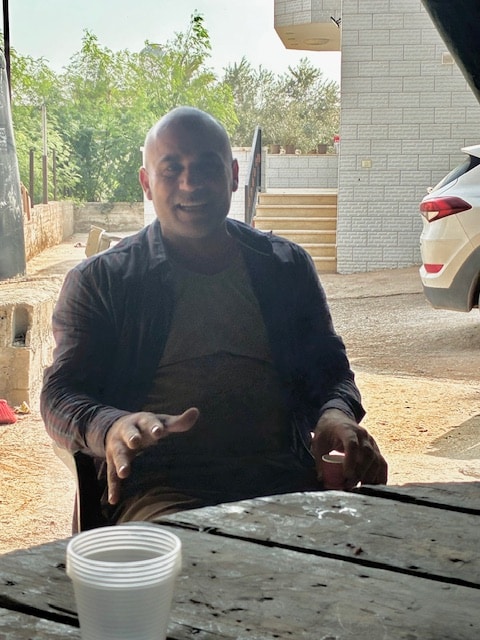
Having tea with Muhammed, Bardala, Jordan Valley
We set out in Muhammed’s battered four-wheel drive. The farm is close to the village, accessible only by a dirt track which Muhammed does his best to maintain. It’s not long before we have to disembark as he coaxes the empty car around a roadblock that settlers have created out of large boulders, to prevent access. We can see the small outpost a few hundred metres away. Its sudden appearance nine months ago changed everything Muhammed says:
‘The settlers have been here less than a year and they come just for a few months. But [in that time] they have destroyed 20 years of work and my entire family life.’
Muhammed, Jordan Valley
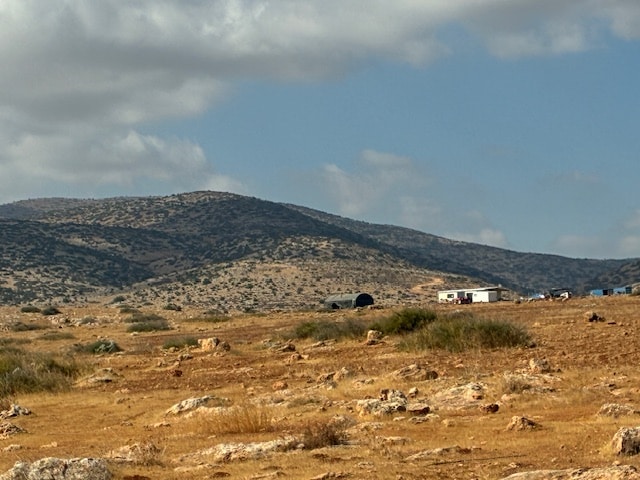
Settler outpost established outside Bardala
The way the outpost was established is typical of the methods developed by the radical settler movement operating in the Jordan Valley, and elsewhere, particularly since the present Netanyahu led coalition government was formed in December 2022. It began with one settler called Itan Zevi who arrived with 30 cows (now more than 100). Although Levi moved on after a few months other settlers have come to take his place, usually staying for a few months at a time.
Despite living all his life under occupation, Muhammed insists that it is the establishment of the outpost that has changed everything. Previously he could farm and live off his land. So too could another 25 families whose land he manages.
The village has a custom allowing anyone to take fruit and vegetables from the land without charge, no matter who owns it. Muhammed may own and farm the land, but it is for everyone. Except that they cannot access it now. Muhammed’s vision is of a land shared and cared for; the paradise which, he says, is being destroyed in front of his eyes.
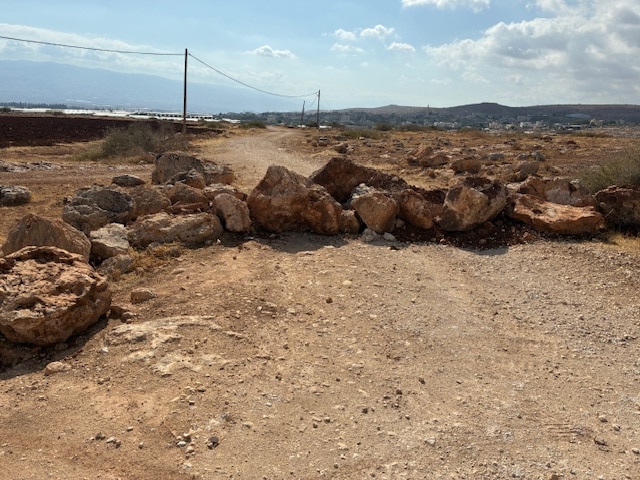
Road to farm blocked by settlers with boulders, Bardala, Jordan Valley
‘Sometimes when I come here, I am crying. I see all my family life being destroyed.’
For 20 years Muhammed has worked on his project – the cultivation of around 740 acres where he grows peppers, watermelon, tomatoes, cucumber, vines and Palestinian wheat. He has put in solar panels to power the pump which draws water from the well and irrigates the crops. But the pipes have been cut by the settlers. The irrigation system has been burnt. Fences have been pulled down so that settlers can graze their cows on Muhammed’s crops – now all destroyed.
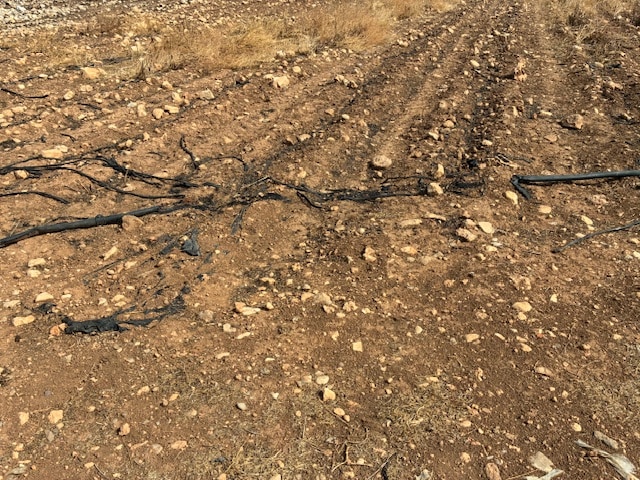
Muhammed’s irrigation system burnt and destroyed by settlers, Bardala
We saw this, and more: burnt agricultural equipment; even picnic tables and chairs set on fire by settlers. Families from the village used to come and picnic on the land in the spring.
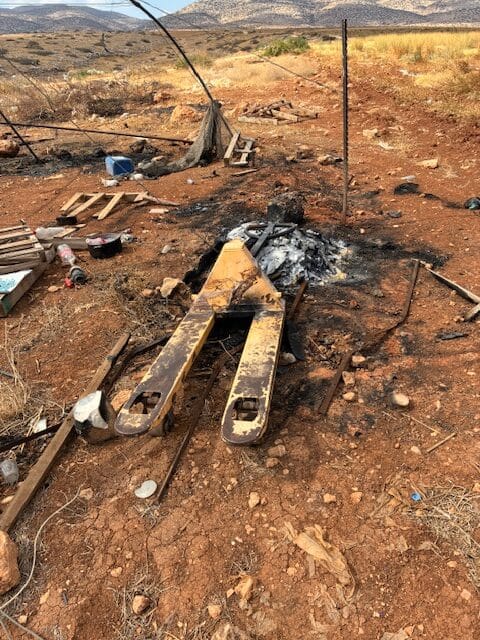
Agricultural equipment burnt by Israeli settlers, Bardala
‘It was amazing in the winter and spring – so green, so free from any kind of pollution, and warm still. People came from far away to hike in the hills.’
Muhammed
Forced displacement of Palestinians and expropriation of land in the West Bank is well documented and has the support of the Israeli government. In August 2025 Cabinet Minister Smotrich who has responsibility for the occupied West Bank presented a plan for the annexation of 82% of the West Bank (bar six built up areas/cities) including the Jordan Valley. Muhammed’s farm, and the land he manages on behalf of 26 families in the village, is part of the plan for annexation.
Smotrich outlined a simple operating principle behind his annexation plan: ‘maximum territory and minimal [Palestinian] population’. His office later clarified that he was referring only to the ‘Arab population’.
Any transfer of the occupier’s civilian population into occupied territory is prohibited under international law (Fourth Geneva Convention) yet in a recent report Médecins Sans Frontières (MSF) warned that its field teams were seeing clear seeing evidence of ethnic cleansing in the West Bank:
‘Palestinians are facing forced mass displacement across the West Bank, Palestine, by Israeli forces and settlers, significantly heightening the risk of ethnic cleansing in the occupied territory.’
Médecins Sans Frontières (MSF)
We ask Muhammed whether he had considered taking his case to the court. He explained:
‘I can’t complain or go to the court. I have four small children. When they get sick I need to be able to take them to the hospital. If I complain to the court, I will be blacklisted and prevented from passing through the checkpoint.’
Muhammed
Muhammed believes he is fighting for his rights. But as well as being clear about the impact of the settlement outpost:
‘I lost my land, I lost my income from the land, I lost my salary to pay the workers, I even lost my self-confidence.’
He blames the government more than the settlers:
‘They are just implementing the government’s policy.’
Muhammed, Jordan Valley
Muhammed shows us the ruins of the village where his father was born, destroyed in 1948 by Israel’s army, in what Palestinians refer to as the Nakba or ‘catastrophe’. He describes how he has watched the international community remain silent, or ineffective, in the face of decades of illegal occupation, illegal settlement expansion and human rights violations. The July 2024 advisory opinion of the International Court of Justice states that the occupation is illegal under international law, and must end as rapidly as possible. Despite this, the Israeli government’s settlement expansion enterprise continues, along with its move towards the full annexation of Palestine.
Muhammed still has some hope, however slight:
‘Our only hope is for a change of government and a change of policy.’
Take action to support Muhammed’s call for a change of policy.
Click here to email your elected representative to demand that our government takes action to stop settlement expansion and annexation:
We need your help to keep this vital work going. Donate today to help us continue witnessing and standing in solidarity with communities in Palestine and Israel.
What does international law say?

